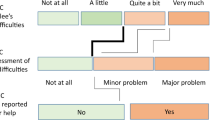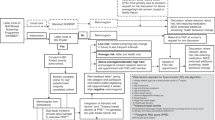Summary
Women referred to a familial breast cancer clinic completed questionnaires before and after counselling and at annual follow-up to assess their risk estimate and psychological characteristics. The aims were to determine whether those who attended the clinic overestimated their risk or were highly anxious and whether counselling influenced risk estimates and levels of distress. Women (n = 450) at this clinic were more likely to underestimate (39%) than overestimate (14%) their risk. Mean trait anxiety scores were higher than general population data (t = 4.9, n = 1059, P < 0.001) but not significantly different from published data from other screening samples. Overestimators (z = 5.69, P < 0.0001) and underestimators (z = –8.01, P < 0.0001) reported significantly different risk estimates (i.e. increased accuracy) after counselling, but significant inaccuracies persisted. Over- (n = 12) and underestimators (n = 60) were still inaccurate in their risk estimates by a factor of 2 after counselling. Thirty per cent of the sample scored above the cut-off (5/6) for case identification on a screening measure for psychological distress, the General Health Questionnaire (GHQ). GHQ scores were significantly lower after counselling (t = 3.6, d.f. = 384, P = 0.0004) with no evidence of increasing risk estimate causing increased distress. The risk of distress after counselling was greater for younger women and those who were more distressed at first presentation. The counselling offered was effective in increasing the accuracy of risk perceptions without causing distress to those who initially underestimated their risk. It is worrying that inaccuracies persisted, particularly as the demand for service has since reduced the consultation time offered in this clinic. Further work is needed to evaluate alternative models of service delivery using more sophisticated methods of assessing understanding of risk.
Similar content being viewed by others
Article PDF
Change history
16 November 2011
This paper was modified 12 months after initial publication to switch to Creative Commons licence terms, as noted at publication
References
Bottorff, J. L., Ratner, P. A. & Johnson, J. L. (1998). Communicating cancer risk information: the challenges of uncertainty. Patient Education Counselling 33: 67–81.
Claus, E. B., Risch, N. K. & Thomson, W. D. (1991). Genetic analysis of breast cancer in the cancer and steroid hormone study. Am J Hum Genet 48: 232–242.
Cox, B., Blaxter, M., Buckle, A., Fenner, N. P., Golding, J., Gore, M., Huppert, F., Nickson, J., Roth, M., Stark, J., Wadsworth, M. & Wichelow, M. (1987). The Health and Lifestyle Survey, Cambridge: Health Promotion Research cited in Goldberg and William (op cit)
Cull, A. (1998). Psychosocial implications of Progress in Breast Cancer Genetics: uncertainties and Challenges. Clin Psychol Psychother 5: 109–123.
Cull, A., Miller, H., Porterfield, T., Mackay, J., Anderson, E. D. C., Steel, C. M. & Elton, R. A. (1998). The use of videotaped information in cancer genetic counselling: a randomised evaluation study. Br J Cancer 77: 830–837.
Cuzick, J. (1985). A Wilcoxon-type test for trend. Stat Med 4: 87–90.
Evans, D. G. R., Burnell, L. D., Hopwood, P. & Howell, A. (1993). Perception of risk in women with a family history of breast cancer. Br J Cancer 67: 612–614.
Evans, D. G. R., Blair, V., Greenhalgh, R., Hopwood, P. & Howell, A. (1994). The impact of genetic counselling on risk perception in women with a family history of breast cancer. Br J Cancer 70: 934–938.
Fallowfield, L. J., Rodway, A. & Baum, M. (1990). What are the psychological factors influencing attendance, non attendance and re-attendance at a breast screening centre?. J Roy Soc Med 83: 547–551.
Gagnon, P., Massie, M. J., Kash, K., Gronert, M., Heerdt, A. S., Brown, K., Sullivan, M. D. & Borgen, P. (1996). Perception of breast cancer risk and psychological distress in women attending a surveillance program. PsychoOncology 5: 259–269.
Goldberg, D. & Williams, P. (1988). GHQ: A Users Guide to the General Health Questionnaire, NFER-Nelson: Windsor
Hallowell, N. & Richards, M. P. M. (1997). Understanding Life’s Lottery: an Evaluation of Studies of Genetic Risk Awareness. J Health Psychol 2: 31–43.
Ingledew, D. K., Hardy, L., Cooper, C. L. & Jemal, H. (1996). Health behaviours reported as coping strategies: a factor analytical study. Br J Health Psychol 13: 263–281.
Kash, K. M., Holland, J. C., Halper, M. S. et al (1992). Psychological distress and surveillance behaviours of women with a family history of breast cancer. J Natl Cancer Inst 84: 24–30.
Knight, R. G., Waal Manning, H. J. & Spears, G. F. (1983). Some norms and reliability data for the State Trait Anxiety Inventory and the Zung Self Rating Depression Scale. Br J Clin Psychol 22: 245–249.
Lerman, C., Daly, M., Sands, C. et al (1993). Mammography adherence and psychological distress among women at risk for breast cancer. J Natl Cancer Inst 85: 1074–1080.
Lerman, C., Kash, K., Stefanek, M. (1994a). Young women at increased risk for breast cancer: perceived risk, psychological wellbeing and surveillance behaviour. Monogr Natl Cancer Inst 16: 171–176.
Lerman, C., Daly, M., Masny, A. et al (1994b). Attitudes about genetic testing for breast–ovarian cancer susceptibility. J Clin Oncol 12: 843–850.
Lerman, C., Lustbader, E., Rimer, B., Daly, M., Miller, S., Sands, C. & Balshem, A. (1995). Effects of individualised breast cancer risk counselling: a Randomised Trial. J Natl Cancer Inst 87: 286–292.
Lloyd, S., Watson, M., Waites, B., Meyer, L., Eeles, R., Ebbs, S. & Tylee, A. (1996). Familial breast cancer: a controlled study of risk perception, psychological morbidity and health beliefs in women attending for genetic counselling. Br J Cancer 74: 482–487.
Marks, G., Richardson, J. L., Graham, J. W. & Levine, A. (1986). Role of health locus of control beliefs and expectations of treatment in adjustment to cancer. J Pers Soc Psychol 51: 443–450.
Miller, S. M. (1987). Monitoring and Blunting: Validation of a Questionnaire to Assess Styles of Information Seeking Under Threat. J Pers Soc Psychol 52: 345–353.
Morris, T. & Greer, S. (1982). Psychological characteristics of women electing to attend a breast screening clinic. Clin Oncol 8: 113–119.
Pharoah, P. D. P. & Mackay, J. (1998). Absolute risk of breast cancer in women at increased risk: a more useful clinical measure than relative risk?. The Breast, (Submitted) Information presented to a Concensus meeting on the management of women with a family history of breast cancer, January 1998, Wellcome Trust: London
Pharoah, P. D. P., Day, N. E., Duffy, S., Easton, D. F. & Ponder, B. A. J. (1997). Family history and the risk of breast cancer: a systematic review and meta-analysis. Int J Cancer 71: 800–809.
Richards, M. & Ponder, M. (1996). Lay understanding of genetics: a test of a hypothesis. J Med Genet 33: 1032–1036.
Spielberger, C. (1983). Manual for the State Trait Anxiety Inventory, Consulting Psychologists Press: Palo Alto, CA
StataCorp (1995). Stata Statistical Software: Release 4.0, Stata Corporation: College Station, TX
Steptoe, A. (1989). An abbreviated version of the Miller Behavioural Style Scale. Br J Clin Psychol 28: 183–184.
Thirlaway, K., Fallowfield, L., Nunnerley, H. & Powles, T. (1996). Anxiety in women ‘at risk’ of developing breast cancer. Br J Cancer 73: 1422–1424.
Wallston, K. A. & Wallston, B. S. (1978). evelopment of the Multidimensional Health Locus of Control Scales. Health Ed Mono 6: (2) 160–170.
Author information
Authors and Affiliations
Rights and permissions
From twelve months after its original publication, this work is licensed under the Creative Commons Attribution-NonCommercial-Share Alike 3.0 Unported License. To view a copy of this license, visit http://creativecommons.org/licenses/by-nc-sa/3.0/
About this article
Cite this article
Cull, A., Anderson, E., Campbell, S. et al. The impact of genetic counselling about breast cancer risk on women’s risk perceptions and levels of distress. Br J Cancer 79, 501–508 (1999). https://doi.org/10.1038/sj.bjc.6690078
Received:
Revised:
Accepted:
Published:
Issue date:
DOI: https://doi.org/10.1038/sj.bjc.6690078
Keywords
This article is cited by
-
How do women who are informed that they are at increased risk of breast cancer appraise their risk? A systematic review of qualitative research
British Journal of Cancer (2022)
-
Psychiatric symptoms in a Spanish sample with hereditary cancer risk
Journal of Community Genetics (2022)
-
Perception of Breast Cancer Risk in Over 11,000 Patients During Routine Mammography Exam
Journal of Cancer Education (2020)
-
Experiences of Women Who Underwent Predictive BRCA 1/2 Mutation Testing Before the Age of 30
Journal of Genetic Counseling (2016)
-
A group approach to genetic counselling of cardiomyopathy patients: satisfaction and psychological outcomes sufficient for further implementation
European Journal of Human Genetics (2015)



